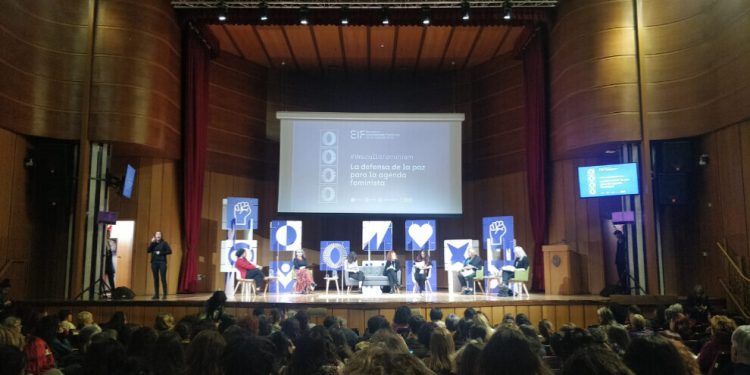NEWS CENTER – Rita Segato, Irina Karamanos, Vadana Shiva, Dacia Maraini, Gioconda Belli, Brigitte Vasallo, Rita Bosaho, the Las Tesis collective or Teresa Peramato are some of the more than one hundred expert voices that gathered on February 24, 25 and 26 at the International Feminist Meeting (EIF) “We call it Feminism” with the aim of generating a space for reflection and dialogue around feminism.
The Spanish Minister for Equality, Irene Montero, stated in her opening speech that “feminism is the main democratizing force in the world.”
Montero encouraged women from different parts of the world to take advantage of the meeting to learn from each other, “take care of ourselves”, “gain strength” and demonstrate “that feminists are more”. And she added: “Alone we cannot, but with friends and in a team and together, yes.”
Activists, academics, politicians and women from around the world attended the meeting to advance the construction of a more just and equal society, and strengthen the voices of women around the world to confront reactionary rhetoric and policies, develop public policies and expand feminist rights.
The representative of the Kurdish Women’s Movement, Melike Yasar, spoke about the defense of peace in the feminist agenda of the women’s movement. She began her speech by stressing “the importance of building a universal fight for women because without building this common fight, we will not be able to break with the patriarchy”, and continued emphatically: “I am not going to talk about our sufferings, I am not going to talk about the oppression of the system towards us, but about what our proposal was, what were the aspects of our struggle to get to have today a society that says ‘the liberation of society is only possible with the liberation of women’. How we did this and how we are building, in the midst of war, a free, ethical, political society that has as its main axis in all areas of life.”
Yasar was clear in stating that “It may seem like a contradiction that we are talking about peace when we all know that Kurdish women use weapons to defend ourselves”, however, she added: “We do not accept the idea that the right to live in peace is seen as a utopia. Not only do we not accept it, but all our efforts and initiatives, as the Liberation Movement and particularly as the Kurdistan Free Women’s Movement, go in this direction, precisely by going beyond thinking about alternatives within the framework of possibilities offered to us. this system. We celebrate these Meetings, because we understand them as a continuity and in line with so many others that we have been promoting. Like those of the Women Weaving the Future network in 2022, which brought together 700 participants from 50 countries in Berlin”.
In this regard, she added: “Organize our struggle on a global scale on all fronts. It is necessary and urgent to overcome fragmentation and build greater coordination among women’s movements around the world, in order to reach a higher level of organization and convert our resistance into radical and sustainable advances that reverse the current conditions of life”.
Regarding the event, she indicated: “We celebrate this meeting because we understand it as continuity and in line with so many others that we have been promoting. Such as those of the Women Weaving the Future network in 2022, which brought together 700 participants from 50 countries in Berlin. For us, they are not only spaces for the reaffirmation of active solidarity with the Revolution in Kurdistan, they are not only a place to recognize and embrace other revolutionary experiences from other continents, but they are authentic opportunities to advance in the construction of a common agenda. that allows us to define clear objectives and achieve concrete transformations.”
She also spoke of resistance strategies and stated: “A struggle focused on women’s liberation has the potential to reach a universal level more than any other struggle given in previous centuries. However, it is not possible to develop an alternative within the system dominant, appealing to its means and methods, much less within the material, moral and institutional limits that the system itself establishes. It is not enough to declare ourselves anti-fascists, anti-colonial, anti-racist, anti-military. We must actively and effectively fight all expressions of the dominant male mindset that manifest beyond biology. Without this change, the liberation of society will not be possible.”
Yasar concluded: “As we say, from the Kurdistan Women’s Movement, we are always asked in the talks: ‘What is the role of women in the Kurdistan revolution? And I always answer: we have no role, we do the revolution Men have the role of changing their own mentality. And I affirm categorically: this is our agenda for peace: to guarantee the autonomy of women; Organizing autonomously is the guarantee of peace. Social peace is that, in all areas of life.”




